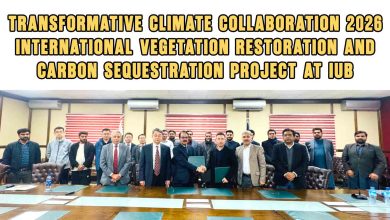Report on Chinese initiatives in green energy industry launched
#Islamabad: #Pakistan-China Institute, in collaboration with All #Pakistan Chinese Enterprises Association (APCEA) and Power Construction Corporation of China launched a ground-breaking report titled “Development Prospects of Chinese Enterprises in Green Energy Industry in Pakistan”.
The launch event of the report was attended by a diverse audience, including representatives from universities, think tanks, Chinese enterprises, and policymakers. The event provided a platform for stakeholders to discuss the findings of the report and explore opportunities for further collaboration between Pakistan and China.
The report and its launch event highlight the growing importance of the #China-Pakistan Economic Corridor (CPEC) and the need for Chinese enterprises to navigate the complex business environment in Pakistan.
The “Development Prospects of Chinese Enterprises in #GreenEnergy Industry in #Pakistan” report is a beacon of hope for the future of sustainable energy in Pakistan. The report provides a holistic analysis of the country’s green energy sector, illuminating the potential for Chinese investors to contribute to Pakistan’s wind, solar, and hydroelectric power projects. From policy and regulation to market demand and financing options, this report serves as a comprehensive guide for Chinese companies seeking to invest in #Pakistan’s burgeoning green energy industry. With this report in hand, investors can confidently navigate the challenges and capitalise on the opportunities, paving the way for a brighter and more sustainable future for Pakistan. Mustafa Hyder Sayed, executive director of Pakistan-China Institute in his welcome remarks said that the launch of the report signifies a major step towards sustainable development and resource efficiency in the bilateral economic cooperation between China and Pakistan.
This report provides a comprehensive analysis of the current state of Chinese investment in Pakistan and the potential for future growth, with a particular focus on green energy projects. It highlights the opportunities and challenges that Chinese enterprises face in Pakistan’s investment landscape and serves as a valuable resource for policymakers, business communities, and scholars seeking to promote sustainable economic growth. By leveraging green energy and resource efficiency, China and Pakistan can strengthen their partnership and drive economic development that benefits both nations in the long term. In his keynote speech, Yang Jiandou, chairman #APCEA, said that as a leading investor in Pakistan, Chinese enterprises have an important role to play in driving sustainable development and promoting a green economy. Through our advanced technology and expertise in renewable energy, we are helping Pakistan transition towards a more sustainable and eco-friendly future. Our investment in renewable energy projects, such as solar and wind power, is not only reducing Pakistan’s carbon footprint but also creating job opportunities and improving #energy security.







